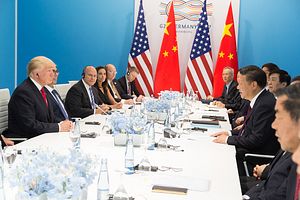As American negotiators return to Beijing this week in the persons of U.S. Trade Representative Robert Lighthizer and Secretary of the Treasury Steven Mnuchin, experienced China watchers will be keen to see if further results that will satisfy the Trump administration will come of the talks. Looming ahead is a March 1 deadline that, unless changed, will see additional tariffs slapped on an already weakening Chinese economy.
Lighthizer and Mnuchin are seasoned in law and government, on Lighthizer’s part, and in the highest levels of finance, on Mnuchin’s part. Their respective credentials for the job at hand, were it simply a matter of a tough international negotiation, are exceptional.
But neither is a China specialist. Neither has lived or, apparently, spent much time in China.
How then, is the American team finding the right formula and personal connection with their Chinese counterparts to advance U.S. interests in the issues at hand? How does the team get beyond the cumbersome, awkward, and stilted model of negotiations, depending as they do on tiresome translation, often in overly-formalized English that does little to convey what the Chinese side is really saying?
Of course, there will be Embassy specialists, fluent in Chinese language but not necessarily in Chinese negotiating style.
The U.S. team will inevitably include political specialists, legal specialists, and trade specialists at the table, or on call.
But at the end of the day, it must be hoped that the team is bolstered by a strong, savvy, China hand who can at the same time be easy and familiar with his or her Chinese counterparts, who can banter in Chinese with them, and who can share memories of earlier times in China with them, having lived those times themselves.
It must also be hoped that that person has years of experience in negotiating everything from commercial contracts to land purchases, from joint venture deals to venture capital investments, from setting up a business in China to shutting it down.
One hopes that this person understands the wit and wiliness of the Chinese negotiating team members, and can engage in discussions with them that take into account the very China-specific style and tone of negotiations and relationship-building.
A knowledgeable and experienced China expert will, as a matter of second nature, be at ease with the formulaic model of Chinese negotiations. The Communist Party negotiates in a boilerplate style across industries and throughout government.
Just as importantly, a China specialist will also engage in verbal nuances, references, and allusions that surprise the Chinese counterpart, building capital that yields agreements, and ultimately concessions.
It is not over-generalizing to say that the Chinese love to negotiate and do so with the same relish and desire to win as they do in games and gambling.
There was a reason that Mao Zedong banned gambling in China. He understood his society’s passion for and addiction to it, and saw the ruin it inevitably brought many.
It is also not over-generalizing to say that Chinese are huge risk takers and are highly competitive. One may be told at the negotiating table that the hope is for a “win-win” result, but more often than not, lurking just below is a strong desire to conquer — in the nicest possible way, of course.
The game of Weiqi, or, as it is known outside of China, “Go,” comes to mind. Go is an ancient, abstract board game dating back at least 2,500 years. Played by two people, the goal is to surround more of the board’s territory than one’s adversary.
Like a Chinese negotiation, the rules of Go are relatively simple. Also, however, like a Chinese negotiation, the inherent scope and strategies required to win the game are highly complex.
Many of the structural trade problems, and the sense that America has “been taken advantage of” by the Chinese, comes from three decades of well-meaning, sincere Americans arriving in China armed with little historical or political perspective on China. Sent to negotiate deals and run businesses with the Chinese, who have always been prepared to look after and maximize their own interests in those deals, American business has given up much of its core value, in intellectual property, in particular.
One of the most difficult issues for not just Americans but for most of the international community to grasp is why the Chinese themselves do not seem to appreciate the intrinsic value of intellectual property, a subject at the heart of the U.S.-China trade war.
Although the professional class in China is now well-grounded in the ideas and concepts of intellectual property, the average Chinese is not. “How can you own a thought?” is a question this correspondent has been asked innumerable times over the years in China.
An experienced China specialist knows how to counter that objection, and many others, in ways that a generalist negotiator may not.
For all concerned, one hopes for a meaningful result in this week’s talks.
If little progress is made, however, the administration would be wise to look for a specialized resource to bring context and clarity into this complex game of Go that the U.S.-China trade war has become.
































